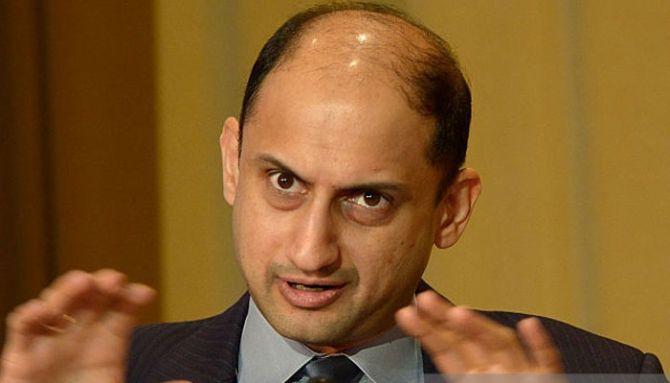 | « Back to article | Print this article |
A lack of adequate disclosures raises the financing costs of corporate firms, especially sub-investment grade ones, and keeps the capital markets small, believes RBI deputy governor Viral Acharya.

Reserve Bank of India Deputy Governor Viral Acharya has called for improving the quality of disclosures of the corporate sector in light of the recent defaults in commercial paper and corporate bond markets even when they were considered investment grade.
“These concerns are worthy of careful scrutiny and assessment relative to the best international practices to help fine-tune standards for the timely disclosure of default-relevant information by corporates,” the outgoing deputy governor said in a speech at the Indian School of Business, Hyderabad.
A lack of adequate disclosures raises the financing costs of corporate firms, especially sub-investment grade ones, and keeps the capital markets small, according to Acharya.
He said the implementation of the Insolvency and Bankruptcy Code will go a “long way in improving participation in the corporate bond market by strengthening the protection of creditor rights”. This is particularly true for a market like India that manages to recover only a quarter of the due, one of the lowest in the world.
“With greater confidence in time-bound and efficient resolutions under the IBC, foreign investors are likely to explore investment in sub-investment grade and distressed corporate assets,” Acharya said.
With the IBC, the legal framework for financial regulation is also moving closer to being comprehensive and effective for non-financial corporate borrowers.
“However, the lack of resolution framework for non-bank financial entities remains a crucial gap that deserves prompt attention of the authorities.”
The deputy governor also stressed upon the need to expand the investor base in the corporate bond and government securities markets. Expanding the base leads to increasing diversity in the market, and it is imperative that the domestic institutional invest base be strengthened.
In the government securities market, calibrated access for global investors -- and through voluntary retention route -- is helping broaden the investor base, while also bringing in diversity of trading views and strategies.
In this regard, gradual easing of statutory liquidity ratio requirement of banks has given the lenders greater flexibility in their investment decisions and added to the diversity of investor base in government securities and state development loans, “which, in turn, have aided efficient pricing of these bonds”.
However, the derivatives markets have not developed as much, and to give a boost, efforts are required in encouraging better risk management by domestic institutions, especially banks.
“With the untapped interest rate derivatives market set for a pickup in the risk management activity of banks and non-banks, the role of complementary markets will strengthen in the years to follow,” Acharya said.
The RBI’s efforts in keeping inflation in check under the new inflation targeting framework will help savings, as the households were moving away from financial assets to physical assets such as housing and gold.
The flexible inflation targeting regime, helped by low oil prices and food supply management, has kept the headline inflation under control during the last five years.
“This way, two preconditions of macroeconomic stability -- stable growth and low inflation -- necessary for financialisation of savings and capital market development are now in place in India,” the deputy governor said.
However, improving pension and insurance coverage for households should be a priority, as it not only leads to social welfare outcomes, but also to a stronger and more stable investor base for capital markets.
“Better financialisation of household savings could be a catalyst for retail participation in markets, in turn providing a boost to collective investment vehicles such as mutual funds and alternative investment funds,” he said.
Photograph: Reuters.